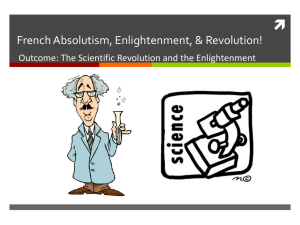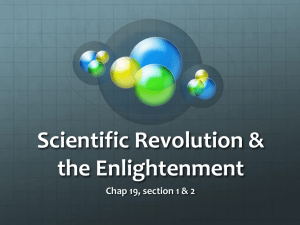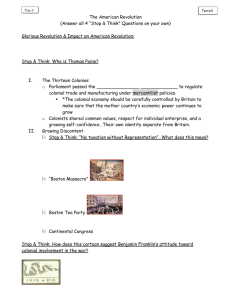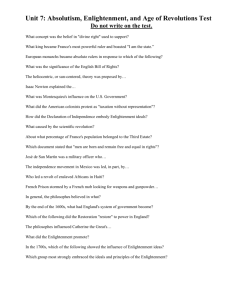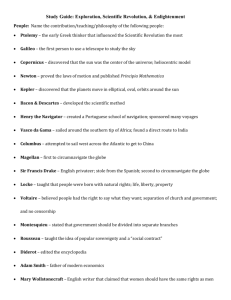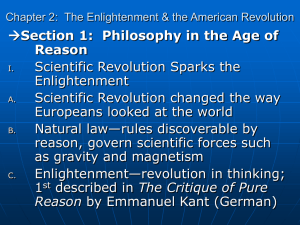Enlightenment & Scientific Revolution Notes
advertisement
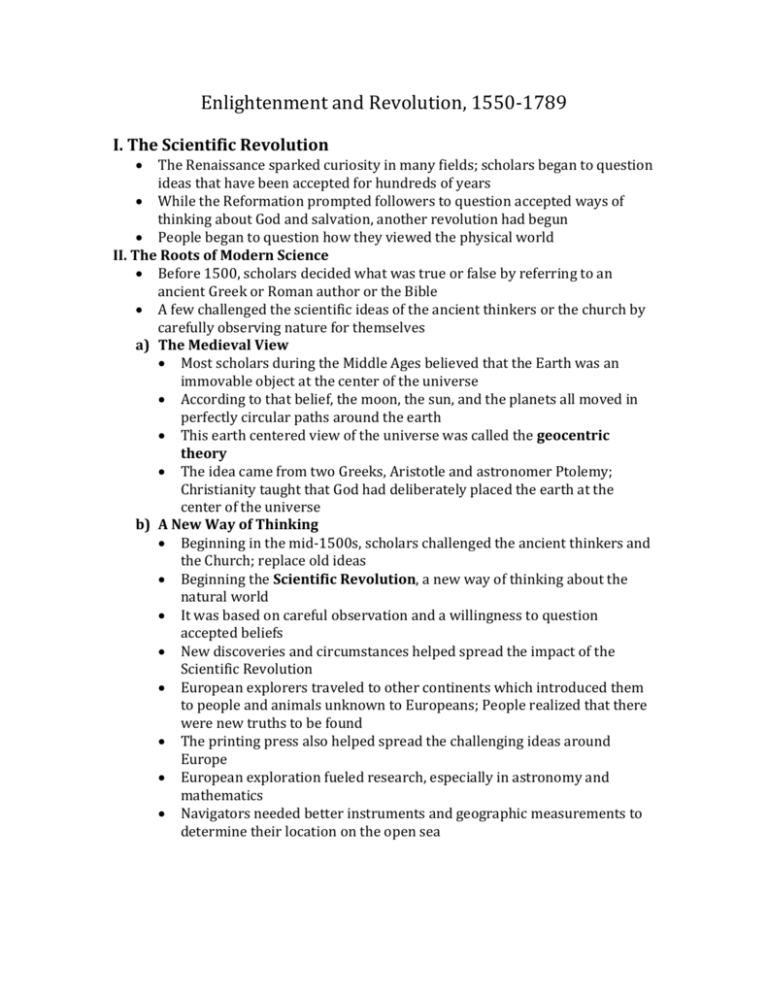
Enlightenment and Revolution, 1550-1789 I. The Scientific Revolution The Renaissance sparked curiosity in many fields; scholars began to question ideas that have been accepted for hundreds of years While the Reformation prompted followers to question accepted ways of thinking about God and salvation, another revolution had begun People began to question how they viewed the physical world II. The Roots of Modern Science Before 1500, scholars decided what was true or false by referring to an ancient Greek or Roman author or the Bible A few challenged the scientific ideas of the ancient thinkers or the church by carefully observing nature for themselves a) The Medieval View Most scholars during the Middle Ages believed that the Earth was an immovable object at the center of the universe According to that belief, the moon, the sun, and the planets all moved in perfectly circular paths around the earth This earth centered view of the universe was called the geocentric theory The idea came from two Greeks, Aristotle and astronomer Ptolemy; Christianity taught that God had deliberately placed the earth at the center of the universe b) A New Way of Thinking Beginning in the mid-1500s, scholars challenged the ancient thinkers and the Church; replace old ideas Beginning the Scientific Revolution, a new way of thinking about the natural world It was based on careful observation and a willingness to question accepted beliefs New discoveries and circumstances helped spread the impact of the Scientific Revolution European explorers traveled to other continents which introduced them to people and animals unknown to Europeans; People realized that there were new truths to be found The printing press also helped spread the challenging ideas around Europe European exploration fueled research, especially in astronomy and mathematics Navigators needed better instruments and geographic measurements to determine their location on the open sea III. A Revolutionary Model of the Universe c) The Heliocentric Theory Although backed by authority and common sense, the geocentric theory did not accurately explain the movements of the sun, moon, and planets A polish astronomer named Nicolaus Copernicus, studied planetary movements for years and reasoned that stars and planets revolved around the sun, an idea that became known as the heliocentric theory Fearing ridicule and persecution, Copernicus didn’t publish his findings until 1543 (year of his death) because he was scared. After Copernicus’s death, a Danish astronomer Tycho Brahe, carefully recorded the movement of the planets for many years; produced much data based on observations; many followers would expand on his data After Brahe’s death in 1601, his assistant, a brilliant mathematician named Johannes Kepler, continued his work After studying Brahe’s data, Kepler concluded that certain mathematical laws govern planetary motion One of these laws showed that the planets revolve around the sun in elliptical orbits instead of circles, as was previously thought; proved Copernicus and ideas were correct d) Galileo’s Discoveries Galileo Galilei was an Italian scientist who built on theories about astronomy Galileo built his own telescope to study the heavens in 1609 In 1610, Galileo published a book describing his observations called Starry Messenger; His discoveries supported Copernicus’s theories. Discovered the law of the pendulum and the fact that falling objects accelerate at fixed and predictable rates Despite his genius, he lived the last years of his life under house arrest because his scientific findings did not go along with the Catholic Church authorities’ interpretation of the Bible. They made him confess that Copernicus’s theory was false; In 1992, the Catholic Church officially acknowledged that Galileo had been right. IV. The Scientific Method The revolution in scientific thinking that Copernicus, Kepler, and Galileo began eventually developed into a new approach to science called the scientific method A logical procedure for gathering and testing ideas. It begins with a problem or question arising from an observation, then scientists form a hypothesis Then the hypothesis is tested in an experiment or on the basis of data Final step-scientists analyze and interpret their data to reach a new conclusion which either confirms or disproves the hypothesis e) Bacon and Descartes Francis Bacon was an English politician and writer who had a passionate interest in science He believed that by better understanding the world, scientists would generate practical knowledge that would improve people’s lives Bacon criticized the techniques of ancient and medieval scholars in his writings He urged that instead of reasoning from abstract theories, scientists need to experiment and then draw conclusions. He argued for the adoption of new scientific techniques such as the experimental method In France, Rene Descartes was a mathematician who developed analytical geometry, which links algebra and geometry Rather than experimentation, Descartes relied on mathematics and logic He urged scientists to rely on mathematics and logic to reach fundamental truths about the natural world Of his own existence he was sure; everything else was doubtful until proved by reason V. Newton Explains the Law of Gravity By the mid-1600s, the accomplishments of Copernicus, Kepler, and Galileo had shattered the old views of astronomy and physics Isaac Newton a great mathematician and physicist, brought together some of the theories and discoveries of Copernicus, Kepler and Galileo under a single theory of motion known as the law of universal gravitation In 1687, Newton published his work in The Mathematical Principles of Natural Philosophy; it was one of the most important scientific works ever written; universe was like a clock, everything worked together perfectly which could be explained mathematically VI. The Scientific Revolution Spreads As astronomers explored the secrets of the universe, others began to study the secrets of the nature on earth The use of the scientific method eventually became important in many different fields f) Scientific Instruments New tools and instruments were developed to make precise observations that the scientific method demanded The first microscope was invented by a Dutch eye glass maker named Zacharias Janssen in 1590 In the 1670s, a Dutch amateur scientist named Anton van Leeuwenhock used a microscope to observe bacteria swimming in tooth scrapings; also examined red blood cells for the first time In 1643, one of Galileo’s students, Evangelista Torricelli developed the first mercury barometer—a tool for measuring atmospheric pressure and predicting weather In 1714, the German physicist, Gabriel Fahrenheit made the first thermometer to use mercury in glass; his thermometer showed water freezing at 32 degrees A Swedish astronomer, Anders Celsius, created another scale for the mercury thermometer in 1742; his scale showed water freezing at 0 degrees g) Medicine and the Human Body During the Middle Ages, European doctors had accepted the writings of ancient Greek physician Galen as fact; never dissected a human body; just pigs and other animals anatomy; assumed it would be the same A physician named Andreas Vesalius proved Galen’s assumptions wrong by dissecting human corpses and published his observations His book, On the Structure of the Human Body (1543), was filled with detailed drawings of human organs, bones, and muscles In the late 1700s, British physician, Edward Jenner introduced a vaccine to prevent small pox; Inoculation using live small pox germs had been practiced in Asia for centuries Robert Boyle was considered the founder of modern chemistry; wrote the Sceptical Chymist Challenged Aristotle’s idea that the physical world consisted of four elements (earth, air, fire, and water) Proposed that matter was made up of smaller particles that joined together in different ways; Boyle’s law explains how the volume, temperature, and pressure of gas affect each other VII. The Enlightenment In Europe In the wake of the Scientific Revolution, philosophers began to reevaluate old notions about other aspects of society They sought new insight into the underlying beliefs regarding government, religion, economics, and education Their efforts spurred the Enlightenment, a new intellectual movement that stressed reason and thought and the power of individuals to solve problems Known as the Age of Reason; brought much change to Western Civilization VIII. Two Views on Government The Enlightenment started from some key ideas put forth by two English political thinkers of the 1600s, Thomas Hobbes and John Locke. h) Hobbe’s Social Contract Thomas Hobbes expressed his views in a work called Leviathan (1651) The English Civil War convinced Hobbes that all humans were naturally selfish and wicked Without governments to keep order, wars would be common and life would be “solitary, poor, nasty, brutish, and short” Hobbes argued that people had to hand over their rights to a strong ruler In exchange, they gained law and order Hobbes called this agreement by which people created a government the social contract. Without government, people would act in their own self interests and chaos would ensue; Saw success in an absolute monarchy i) Locke’s Natural Rights The philosopher John Locke held a different, more positive view of human nature He believed that people could learn from experience and improve themselves; they have the natural ability to govern their own affairs and to look after the welfare of society Did not approve of an absolute monarchy; favored the idea of selfgovernment According to Locke, all people are born free and equal with three natural rights that no ruler should ever take away: Life, Liberty, and Property. The purpose of government, according to Locke, is to protect these rights of the people If a government fails to do so, citizens have the right to overthrow it; government power comes from consent of the people IX. The Philosophes Advocate Reason The Enlightenment reached its height in France in the mid-1700s Paris became the destination for people who wanted to discuss politics and ideas The social critics of this period in France were known as philosophes— French word for philosophers They believed that people could apply reason to all aspects of life, just as Isaac Newton had applied reason to science Five concepts formed the core of the philosophe beliefs: 1. Reason—truth could be discovered through reason and logic 2. Nature—what was natural was good and reasonable 3. Happiness—people should seek well being on earth 4. Progress—stressed that humankind could improve 5. Liberty—called for the freedoms won in the Glorious Revolution and English Bill of Rights j) Voltaire Combats Tolerance One of the most brilliant and most influential of the philosophes was Voltaire; he published more than 70 books of political essays, philosophy, and drama. He often used satire against his opponents; he made frequent targets of the clergy, aristocracy, and the government Although he made powerful enemies, Voltaire never stopped fighting for tolerance, reason, freedom of religious belief, and freedom of speech He summed up his staunch defense of liberty in one of his most famous quotes: “I do not agree with a word you say but will defend to the death your right to say it” k) Montesquieu and the Separation of Powers Another influential French writer, the Baron de Montesquieu, devoted himself to the study of political liberty He believed that Great Britain was the best governed and most politically balanced country of its day The British king and his ministers held executive power, they carried out the laws; Parliament held legislative power, they created the laws for the country; the Judges of the English courts held judicial power, they interpreted and applied the law Montesquieu called this division of power among different branches, separation of powers In his book, On the Spirit of Laws (1748), he proposed that separation of powers would keep any individual or group from gaining total control of the government This would lead to the idea of checks and balances and would be a key ingredient to the U.S. Constitution l) Rousseau: Champion of Freedom Jean Jacques Rousseau, was passionately committed to individual freedom The son of a poor, Swiss watchmaker, he won recognition as a writer of essays He strongly disagreed with other Enlightenment thinkers on many matters Most people believed that reason would improve life for all people; he believed that civilization corrupted people’s natural goodness Rousseau believed that the only good government was one that was freely formed by the people and guided by the “general will” of society—a direct democracy Under such a government, people agree to give up some of their freedom in favor of the common good Rousseau’s social contract differed from Hobbes in that it was an agreement among free individuals to create a society and a government He argued that legitimate government came from the consent of the governed; the people Argued that all people were equal and that titles of nobility should be abolished; Inspired many of the leaders of the French Revolution (1789) m) Beccaria Promotes Criminal Justice An Italian philosophe named Cesare Beccaria turned his thoughts to the justice system Believed that laws existed to preserve social order, not to avenge crimes; often criticized common abuses of justice This included the torturing of witnesses, irregular proceedings in trials, and punishments that were cruel in nature He argued that people accused of crimes should be given a speedy trial and that the degree of punishment should meet the severity of the crime committed; capital punishment should also be abolished He used his ideas about justice on the principle that governments should seek the greatest good for the greatest number of people; influenced law reform in Europe and North America X. Women and the Enlightenment The philosophes challenged many assumptions about government and society, but they often took traditional views toward women Some male writers argued for more education for women and for women’s equality in marriage During the 1700s, other women picked up on these themes Among the most persuasive was Mary Wollstonecraft, who published an essay called A Vindication of the Rights of Woman in 1792 She argued that women, like men, need education to become virtuous and useful; also urged women to enter the male dominated fields of medicine and politics; their education should not be secondary to men’s. Other women spread the enlightenment through social gatherings called salons XI. Legacy of the Enlightenment Although the philosophes encouraged reform, they were not active revolutionaries Their theories did however inspire the American and French Revolutions and other movements of the 1800s Enlightenment thinkers produced three other long term effects that helped shape Western Civilization n) Belief in Progress Pioneers such as Galileo and Newton had discovered the key for unlocking the mysteries of nature in the 1500s and 1600s The growth of scientific knowledge seemed to quicken during the 1700s The successes of the Scientific Revolution gave the people the confidence that human reason could solve social problems Reformers urged an end to the practice of slavery and argued for greater social equality; democratic gov’t o) A More Secular Outlook People began to question openly their religious beliefs and the teachings of the church; a more secular outlook of the world Mysteries that were once explained by the church were one by one explained mathematically by scientists Their findings led people to change the way they thought about God Others like Voltaire, wanted to rid religious faith of superstition and promote religious tolerance p) Importance of the Individual The world also began to see the rise of individualism People began to turn away from the church and royalty and looked to themselves instead Use your own ability to reason to judge what was right and wrong Emphasis on the individual in society; Adam Smith believed that individual self interest created economic progress; government was formed by individuals to promote their welfare During the Enlightenment, reason took center stage The greatest minds of Europe followed each other’s work with interest and often met to discuss their ideas. Kings and queens would also become interested which would lead to progress in their respective countries XII. The American Revolution Philosophes like Voltaire considered England’s government the most progressive in Europe In 1688, England became a constitutional monarchy; Laws limited the power of the king England’s colonists in North America accused England of tyrannical rule; would eventually attempt to overthrow the mightiest power on earth XIII. Britain and its American Colonies Throughout the 1600s and 1700s, British colonists had formed a large, thriving settlement along the eastern shore of North America Population was growing by leaps and bounds when King George III took the throne in 1760. By the mid 1700s, the colonists had been living in North America for 150 years; each of the colonies had their own form of government and a great degree of independence In 1651, the British Parliament passed a trade law called the Navigation Act This law prevented colonists from selling their products to any country except Britain In addition colonists had to pay high taxes on imported French and Dutch goods Britain benefited greatly from these policies: bought American raw materials cheap and sold manufactured goods to the colonies at high prices (mercantilism) XIV. Americans Win Independence From 1754-1763, the French and Indian War was taking place in North America. The French had many colonies in North America and incorporated the help of numerous Native American tribes to fight the British Still, Britain was victorious and claimed all of the territories that were once under French control In order to fight the war, Britain had run up a huge debt. Britain decided to run up the taxes on the colonists to pay for the cost of war; this led to many tensions In 1765, Parliament passed the Stamp Act With this new law, colonists had to pay a tax to have an official stamp put on wills, deeds, newspapers, and other printed materials. This was the first time that the colonists had to pay directly to the British government; this outraged the colonists Argued that this violated the colonists natural rights and accused the British government of “taxation without representation”; colonists had no representation in Parliament q) Growing Hostility Leads to War Over the next decade, hostilities increased between both sides In 1773, to protest the Tea Act, a group of colonists dumped a large load of British tea into Boston Harbor. King George III angry at this “Boston Tea Party”, ordered the British navy to close the port of Boston Such tactics made enemies of even moderate colonists In Sept. 1774, representatives from every colony except Georgia, gathered in Philadelphia, PA to form the First Continental Congress; This group protested the treatment of Boston When the King paid little attention to their complaints, the colonies decided to form the Second Continental Congress to discuss Independence In April 1775, British soldiers and colonial militia exchanged gunfire in Lexington, Massachusetts; the fighting eventually spread to nearby Concord The Second Continental Congress voted to raise an army and organize under the command of Gen. George Washington This was the start of the American Revolution r) The Influence of the Enlightenment Colonial leaders used Enlightenment ideas to justify independence The colonists had asked for the same political rights as the people in Britain, but had been denied by the king. This was justification for rebelling against a tyrant who had broken the social contract In July 1776, the Second Continental Congress issued the Declaration of Independence This document written by Thomas Jefferson, was firmly based on the ideas John Locke and the Enlightenment It reflected the argument for natural rights among these “life, liberty, and the pursuit of happiness” Since Locke said that people had the right to rebel against an unjust ruler, the colonies, the Declaration said, “are absolved from all allegiance to the British crown” s) Success for the Colonists Shortly after the publication of the Declaration of Independence, the two sides went to war The colonists seemed to be ready for a quick defeat; colonial militia vs. the well trained forces of Britain In the end, with the help of the French, America won their war for independence There were many reasons why they won 1. Motivation for fighting the war was in America’s favor--defending their homeland against the tyranny of a motherland that was 3000 miles away; fighting for basic civil liberties 2. Overconfident British generals made several costly mistakes 3. Time was on the side of the Americans--Britain was 3000 miles away. The war became very expensive; British citizens were being heavily taxed 4. Louis XVI had little sympathy for the American cause--he could not resist weakening the British. The French entered the war in 1778 and the American/French alliance defeated Lord Cornwallis at the Battle of Yorktown in 1781. This proved to be the decisive victory for the Americans over the British army XV. Americans Create a Republic The 13 individual states recognized the need for a strong central government shortly after the war was won In 1781, the first plan of government was created, the Articles of Confederation It established a republic, a government in which citizens rule through elected representatives t) A Weak National Government This new government was a loose confederation in which the states held all the power. It deliberately created a weak federal government; no executive branch and no judicial branch One body of government: Legislative branch—each state had one vote in Congress Many limitations on what they could do (making laws, entering treaties, taxation) states could refuse Many problems began to arise Without the ability to tax the states, there was no money for the government to operate; could only request contributions Some states began to put tariffs on goods from neighboring states to raise money; starting overtaxing their own citizens u) A New Constitution Colonial leaders began to realize that the Articles of Confederation was not working and that a strong national government needed to be formed On May 25, 1787, 55 delegates were sent to Philadelphia for the Constitutional Convention v) The Federal System To avoid having one group or branch become too powerful, the government that was established was three separate branches— legislative, executive, and judicial The set up provided for a built in checks and balances—each branch checking the actions of the other two. Although the U.S. Constitution created a strong central government, power was still shared with the state governments. Federal system—power was divided between national and state governments w) The Bill of Rights For the Constitution to become the supreme law of the land, 9 of 13 states had to ratify the document Federalists vs. Anti-Federalists The Federalists promised to add a bill of rights to the Constitution; this cleared the way for approval Bill of Rights—first ten amendments to the Constitution (protection of our civil liberties); advocated by Voltaire, Rousseau, and Locke The Constitution and Bill of Rights marked a turning point in people’s ideas about government It put Enlightenment ideas into practice This expressed an optimistic view that reason and reform could prevail and that progress was inevitable
